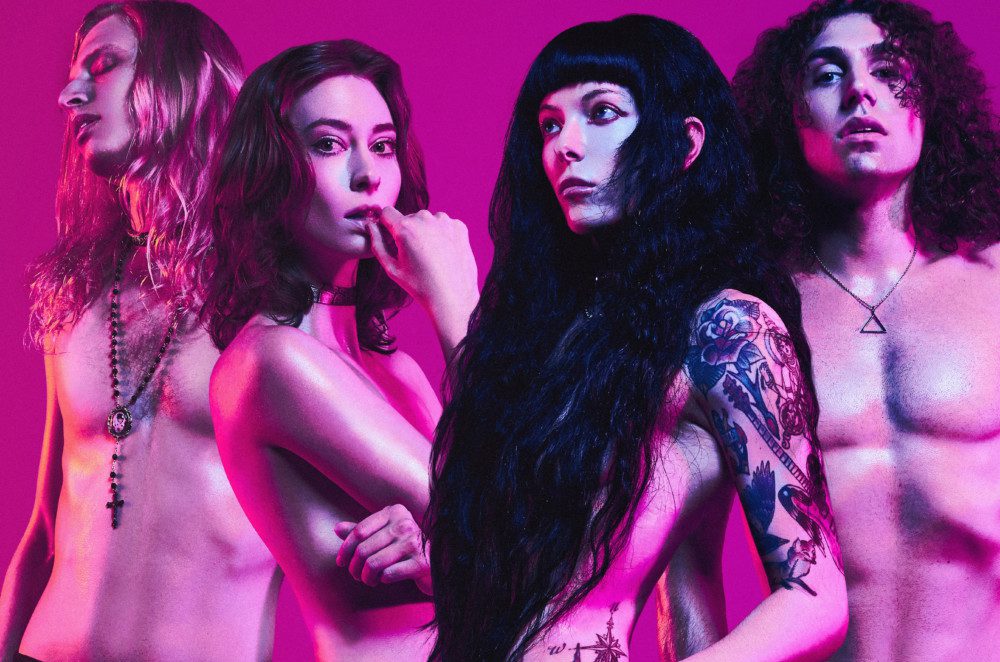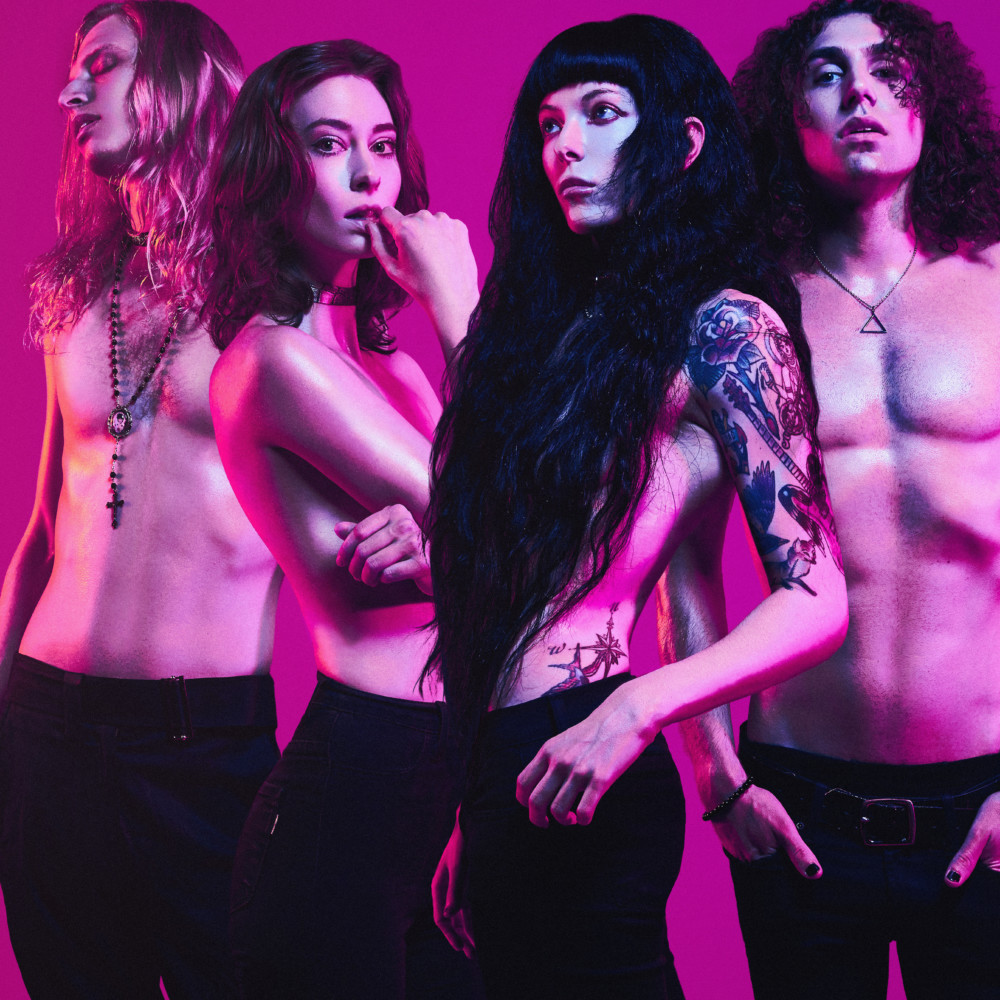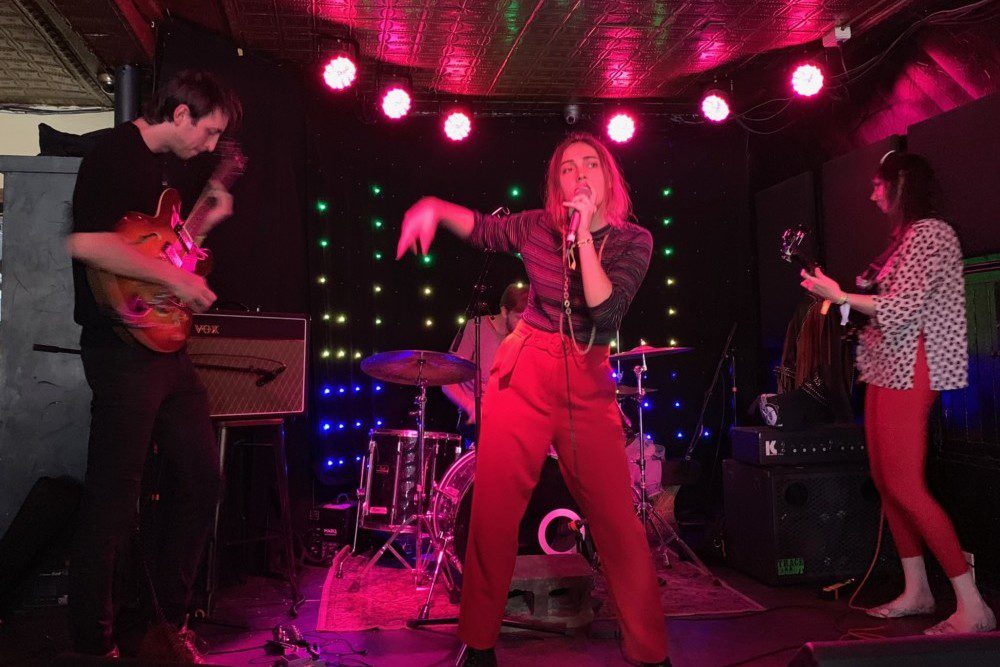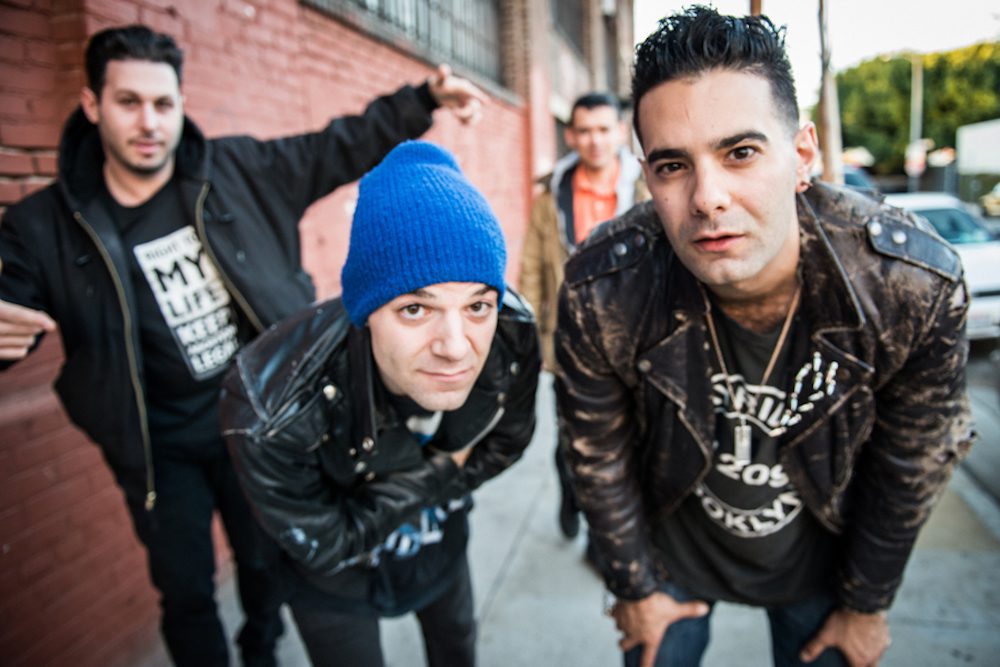PLAYING ATLANTA: Starbenders Keep Rock Alive (And Weird) With Their Biggest Year Yet


When considering the Atlanta music scene, few bands encapsulate the weird, ecstatic, constantly-changing energy as well as Starbenders. The halfway home for misunderstood misfits, fringers, and glam punks, Starbenders — made up of Emily Moon on the drums, bassist Aaron Lecesne, guitarist and vocalist Kriss Tokaji, and the fierce lead vocalist and guitarist Kimi Shelter — is a sonic assault from the very first note, and their legions of fans across the globe are ready and willing to prove it.
In October, the foursome took their show to the other side of the world, touring for the first time in Japan. I caught up with the group upon their return to talk about touring far away lands, rebellion, and rock ’n roll.
AF: You just got back from what looked like an incredible tour in Japan. What was that like? What was the biggest difference from playing and touring in the US?
KT: Japan was incredible. There was so much to see and experience. The culture is so fascinating, and Tokyo is a remarkable city that’s so full of life and prosperity. While playing shows in Japan, we witnessed a certain level of respect and a passion for music that we don’t really see in the States too often. It was a very positive artistic environment. Everyone was at these shows purely for the love of music and the live performance. People were truly engaged, and they were there to see and feel something real and tangible.
AL: I think in America we can be a little cynical or pretentious about music sometimes. Japan seems to be much more unapologetic in their appreciation for all things music. The enthusiasm there is palpable. There are record stores on every corner, and trucks drive through the streets with images of artists plastered on their sides. Big LED screens advertise new albums everywhere you go. The overall attitude towards music from audiences struck me as very pure and joyful.
AF: How has ATL and its musical history influenced you? What statement do you want to make with your music about the city, and what do you love most about the Atlanta music scene?
AL: Atlanta is weird, and that’s the best part. That’s not only what I like most about it, but it’s also a statement I stand behind with our music. Keep being weird, Atlanta. I’ll always be proud to call you home.
AF: What’s been the proudest moment for you guys? The most challenging?
EM: I’d say touring in Japan was both our proudest and most challenging moment. Flying 14 hours across the world to play music to an entirely different culture was both rattling and extremely fulfilling. I think I can speak for all of us when I say it didn’t really hit us until we arrived at the airport the journey we were about to embark on. The language barrier once getting to Japan was what was challenging – I remember a distinct moment during sound check when all we could do is tell the in-house sound guy, “Led Zeppelin! Make it sound like Led Zeppelin!”
KT: Playing in Japan was nothing short of a dream come true. We were able to meet so many wonderful people at these shows, as well as share the stage with some amazing artists. It’s a testament to how universal rock n’ roll is. Despite thousands of miles existing between us, we feel the same love and passion for loud guitars and drums. It was an amazing experience. The most challenging thing for us might have been the language barrier, as well as getting used to certain customs and a way of life we were not familiar with. Throughout our time in Tokyo, we were constantly learning and adapting to our surroundings, and that’s what really opened our eyes to Japanese culture.
AF: You’ve released a single and a new EP this year. How has your creative process grown and evolved since your first release in 2016? Is it collaborative, or does one of you tend to come in with an idea and present it to the group?
KS: I often compare our songs to a human body. I build the skeleton and the rest of the band and I work together to attach the muscles and tendons that mobilize the piece into a living and breathing organism. This has been our process since day one.
AF: 21st Century Orphan packs an even heavier punch than Heavy Petting, which was a killer debut album. Did you go in intending to sharpen the edge? Do you ever find it difficult to just let it all go and give in to the music?
KS: Thank you so much! We move freely through different textures and genres. The moment you start trying to put bumpers on your creativity is the moment you will prevent something really special from coming out. I believe that you should only prune a grown tree – why disassemble the seed? We protect that sentiment as much as we can and that is what allows us to keep people guessing. It’s just the Starbenders sound.
AL: Letting it all go and giving into the music is pretty much what I live for, so it’s definitely not difficult. Performance is an almost meditative state for me because my mind is never quiet and when we play, it’s liberating. It’s like going into a trance but exhilarating at the same time, and it’s the one drug I’ve never developed a tolerance for.
AF: In my eyes, Starbenders is a musical representation of rebellion and nonconformity. You’re not afraid to blend genres, take risks, and create something entirely unique. What does that mean to you? How has music allowed you to express yourself freely and without fear, and do you think your fans feel the same way when listening to your music or attending a show?
KS: Music is freedom. I want to convey that freedom to the listener as much as possible. As an artist, we need to accept the vulnerability that comes with creating in a way that makes you strong and not weak. Art and beauty are in the eye (or ear) of the beholder. A compelling and consistent act should be polarizing. I don’t want people to “sort of” like us. It’s better to be hated or loved. That’s what makes us free.
EM: I can’t really go around hitting people with sticks and honestly that’d be scary for everyone involved so luckily I’m in a rock band that allows me to beat the shit out of drums instead. I should hope when people see us perform they feel the angst and raw power in their bones that’s vibing off of the stage and if they don’t then they can just go back to scrolling through Instagram.
AF: One of my favorite questions to ask musicians is how they feel about being a voice for people who may be silenced, out of fear, insecurity, or even governmental/societal oppression. What role do you think art plays in giving a voice to the silenced?
KS: Through standing strong it might help to inspire someone out there to know they aren’t alone. I often tell people that if I can make it through, they can too. There are more of us than there are of them and WE belong to the misfits.
AL: Personally, I hesitate to put art on a pedestal as some kind of noble pursuit in and of itself. Like any medium, what matters is how you use it. We put our entire beings into this, and I would hope the things we’re passionate about – equality, love, empathy, tolerance, and compassion – shine through as a positive message. That being said, we’re rebels at heart who aren’t satisfied with the status quo. We’re in the trenches with everyone else, and our job isn’t to speak for anyone so much as it is to raise the flag and beat the drum on the march towards change. If you’re ready to fix bayonets and charge, we’re right there beside you because we ARE you.
AF: You’ve been heavily involved in various charities since your conception. What kind of awareness do you hope to spread using the Starbenders platform?
KT: Music is a powerful conduit. With all that’s wrong in the world, it’s our responsibility to use the tools we possess to help fight off the evil and the turmoil that exist in our society. We feel there is no stronger voice than rock n’ roll, and it’s necessary for us to use that voice to spread the word about issues we feel strongly about.
KS: Cultivating awareness through social media is a very big part of life now. But people can forget to put their bodies to work for the name of a cause. The physical realm still needs us and boots on the ground can be vital. We don’t work with charities for the brownie points; we do it because we have a calling to do so.
AF: Who are you listening to, and who would you say had the most influence on you as a band?
KS: I’m all over the place. I grew up playing violin, so I carried the drama of classical music into my repertoire. Phasing from classical music I fell in love with punk, which developed the thunder in my heart. Thunder and drama met the mission when I encountered rock n’ roll. I listen to anything that grabs me… Vivaldi, Miles Davis, New York Dolls, The Sex Pistols, Bowie, Placebo, Dead Kennedys, Stevie Wonder. It’s not a musical act that carries the influence. It’s thunder, drama and the mission. I’m moved by the storm that wakes me up in the middle of the night.
AL: As a bassist, most recently I’ve been digging in to how [Motown legend] James Jamerson played. He’s just so deft and slick but everything he plays serves the song, and his style defined a whole era. As a fan of music, that new Of Montreal album has me hooked.
KT: My two biggest musical influences are Led Zeppelin and Prince. Others include Hendrix, Thin Lizzy, Pink Floyd, Queen, The Stones, Bowie, The Cure, U2, Oasis, Bauhaus, The Clash, and The Damned. Rock n’ roll was my first true love in music, but I’ve always been fascinated with the other styles, genres, and sounds that the world has to offer. Classical and gypsy jazz are two other styles of music I adore and draw influence from.
EM: Paramore, Faye Webster, The Power Station…definite influence for some of our new recordings, Wolf Alice.
Keep in touch with STARBENDERS via Facebook, Instagram, and Twitter, and check back with Audiofemme every other Wednesday for the latest installment of PLAYING ATLANTA.




